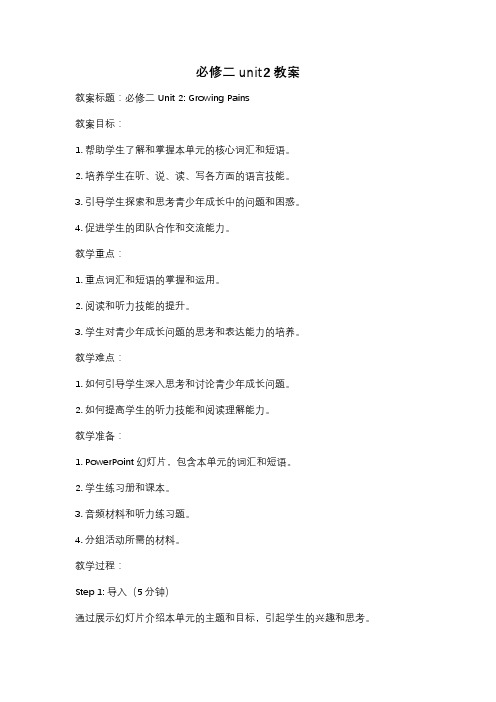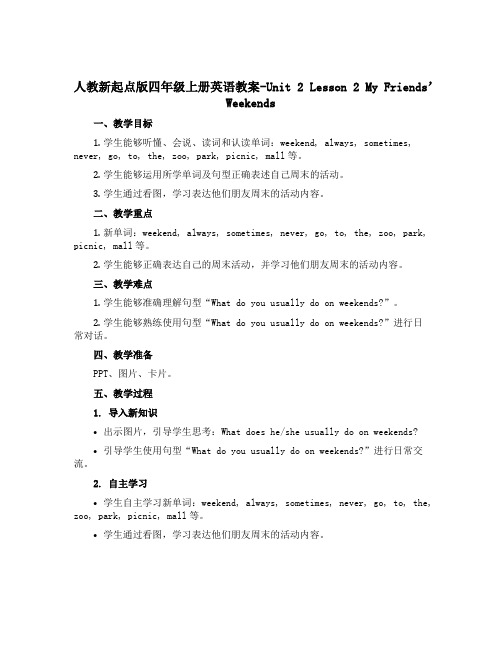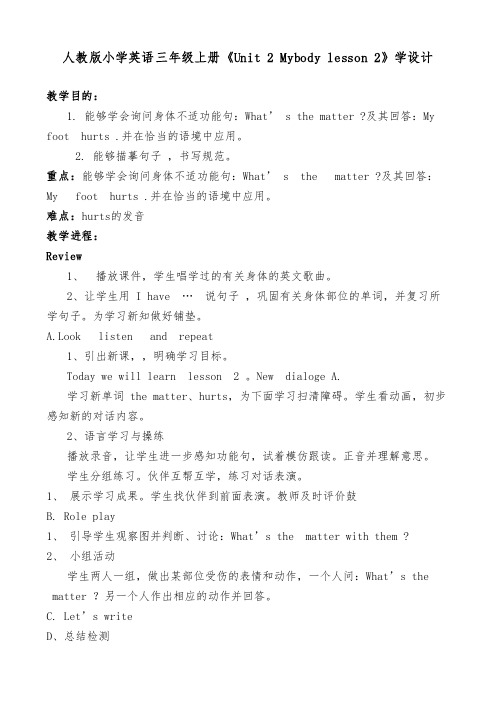《成长英语》Unit 2教案
重大出版社 成长英语 I Unit2

college life, you need to make
your own timetable to follow. Are you getting ready for your
College study?
Contents
1 2 3 4 5
Open Your Mouth
Sharpen Your Listening
Kang Lin: Sure, but I don’t know what courses you prefer,
Open Your Mouth
Activity 2
Complete the following dialogue by translating into English the Chinese given in the brackets.
Broaden Your View
Use Your Hands
Practice Your Grammar
Open Your Mouth
Open Your Mouth
What are these friends saying? Complete the
五年级下册英语教案-Unit 6《Growing Up》(Lesson 2)|人教(新起点)

五年级下册英语教案-Unit 6《Growing Up》(Lesson 2)|人教(新起点)一、教学目标1.能听懂、会说并书写以下单词:glasses, ears, nose, mouth, short, tall, long, hair。
2.能理解、朗读并背诵课文《Growing Up》。
3.能询问他人的外貌特征并回答。
4.能熟练运用句式What does he/she look like? He/She is …… 句型进行交流。
二、教学重难点1.教学重点:教授单词、掌握句型。
2.教学难点:引导学生用所学知识进行交流。
三、教学过程1. 导入1.呈现单词图片,Ask and Answer。
2.Get ready,Show Time! Ask and Answer。
2. 学习重点1.预习课文,draw and write。
2.Listen, read and recite。
3.Sing a song: Head, Shoulders, Knees and Toes。
3. 学习扩展1.Look and guess。
2.Speak out。
plete the sentences。
4.Speak up。
四、教学评价1.通过听说读写多方位训练,使学生能掌握所学内容。
2.通过适当引导,学生能运用所学知识进行交流。
五、教学练习1.Listen and circle.2.Look and fill in the blanks.3.Speak up.4.Group work.六、课后延伸1.Act it out。
2.Draw and write。
七、教学反思本课通过多种多样的教学方式,使学生在愉悦的氛围中掌握所学知识,同时借助低年级学生好奇心强的特点,通过猜测与比较来促进学生语言的积累与提高,达到预期的教学效果,促进学生学习思维的发展。
人教版新起点2年级上册英语教案Unit2 Boys and Girls Story Time

T: What does“tiny”mean? Yes, tiny means very small.
T:(呈现火烈鸟和蜜蜂的选项图)Look at the picture. Which one is tiny? Yes, the bee is tiny . It’s so small.
Ss: Maybe they see a monster.
Ss: Is he a man / Is he a tiger?(角色朗读)
5.Ss: 跟读。
Ss: 角色扮演朗读: Aagghh! No!
6.Ss: 回答问题。 跟读: Oh, he is my friend.
1.跟读课文
播放视频,呈现图片,使学生直观感受功能句。
3.(图3和图4)T:Look at the rabbit. How does she feel? Oh, she is very scared. Can you guess: What happens?
T: Maybe they see some terrible things. Can you read it like the rabbit and the duck? Let’s listen first. (播放听力材料:Is he a man?/Is he a tiger?)T:Can you have a try? Great!
2.(视频结束,问)T:What’s his name? Yes , his name is Bingo. He is our good friend.(Dog is our good friend.)
3.T: Today, we’re going to read a story about animals and their good friends.Are you ready?
《成长英语》Unit 2教案

Unit TwoWell Begun, Half DoneListening and speakingTeaching Materials Analysis:In Part I open your mouth we are going to talk about course information and deciding what course to choose In Part II Sharpen your listening we are going to listen and learn more course-choosing information and dealing with the things involved in.Teaching Objectives:I. Knowledge objectives1. Master the useful sentences2. Learn to talk about course information and deciding what course tochoose3. Know more course-choosing information and dealing with the things involved in.II. Ability objectives1. Enhance the students’ listening and speaking abilities2. D evelop the students’ intercommunion abilitiesImportant Points:Imitate the situational conversations and learn how to speakDifficult Points:Use the new expressions fluentlyTeaching Methods:1. Task-based teaching method2. Imitation and practiceSuggested Time:Two periodsTeaching Procedures:I. lead-inOnce college classes start, you have to wave goodbye to the high school, and say hello to many new friends from different parts of the country. You no longer need toattend classes seven hours a day, and you have to learn and live independently, so for the first several weeks you may have a lot of worries over how to get along with your study. In order to quickly adapt yourself to college life, you need to make your own timetable to follow .Are you getting ready for your College study?II. Open your mouthStep 1 Introduce the teaching goals of this unit;Step 2 Ask students to do pair work, discussing what will get involved in choosing course;Step 3 . Require students to list as many words and expressions as possible about course-choosing Step 4Have students role-play Conversation 1, 2, 3;Step 5Pick out some important words, phrases, and sentence patterns about course-choosing and help students try to apply them into real practice, and finish Activity 3..Reference:A: Good morning. You’re a freshman, aren’t you?B: Yeah! Um… could you tell me how to choose courses?A: Sure, my pleasure. Actually, you’ve got the same problem as I did one year ago.B: What should I consider when I choose my courses?A: Generally speaking, you may think of two things: one is your interest, and the other is whether they are practical.B: Um, let me think. OK. I’d like to consider both.A: What about the English Writing Course?B: Well. What are the benefits?A: It emphasizes the practical skills. And I’m sure you will learn many prac tical English skills.B: Is this hard for freshmen?A: Actually, they’re not too hard if you put your mind to them.B: What are the requirements for this course?A: Firstly, it requires students to attend classes regularly. Secondly, at the end of this semester you should hand in a course paper and take part in a final exam.B: Great! No problem. I won’t miss this chance to improve m y practical English skills. By the way, can you recommend some reference books for this course?A: OK, I will offer you a list of reference books this afternoon. And good luck to you!B: Many thanks.A: You’re welcome.III. Sharpen your listeningStep 1 Present students some difficult words, phrases, and sentence patterns which appear in the listening part;Step 2Familiarize students with the new words, and ask them to read aloud after the teacher;Step 3Tell students some listening skills such as how to catch the main point;Step 4Ask students to guess the main idea of Dialogue 1 and learn to classify the information according to the category items while they are listeningStep 5Play the recording and check answersStep 6 Dialogue 2 and Passage can also be conducted in the similar way.Dialogue 1A: When will we have the final test for the English Writing Course?B: It will be in the 19th week?A: What’s on the test?B: Some basic knowledge about this course, and its application.A: What should I do if I failed the exam?B: Then you have to sit for a make-up exam. I know you’re a hard-working guy, and I’m sure you won’t fail.A: Thank you. I hope not. And how many students often fail in this course?B: It’s hard to say. Usually, less than 10 percent.Dialogue 2A: What about your English Reading Course? Is it interesting?B: Yes, it’s not only interesting, but practical.A: Really?B: Sure. In this course we can learn how to improve our reading skills.A: How I wish I could choose that course.B: Don’t be sad. You still have a chance next semester if you sign up early enough.A: I hope so. Anyway, could you lend me your notes about this course?B: Sorry, I left them in my school desk. How about giving them to you tomorrow morning?A: OK. See you then.PassageWith so many different classes available, it can be difficult to pick what classes would be best for you. A teacher will make sure that you are selecting courses that fulfill all of your graduation requirements. In addition, you should consider the practical aspects of each course as well, such as the professor, the time of day, the class size, and the amount of assignments.IV. SummaryUseful Sentences1. Could you tell me how to choose courses?2. You can choose some selective courses you are interested in.3. Actually, they‘re not too hard if you put your mind to them.4. Would you mind giving me some advice on choosing courses?5. Could you recommend a practical course for me?6. It may involve so much effort.V. Assignment1. Remember the useful sentences.2. Workbook Unit 1 Part I: ListeningUnit TwoWell Begun, Half DonePassage A My Unforgettable learning Experience Teaching Materials Analysis:Part III Broaden your view Passage A presents an unforgettable college experience which makes students reminiscent of their college life. Teaching Objectives:I. Knowledge objectives1. Master the new words and expressions;2. Understand the difficult sentences;3. Understand the main ideas of Text A.II. Ability objectives1. Cultivate the students’ reading comprehension abilities2. Improve the students’ skimming and scanning skillsImportant Points:1. Understand the difficult sentences2. I mprove the students’ reading abilityDifficult Points:I mprove the students’ reading abilityTeaching Methods:1. Student-centered teaching method2. Task-based teaching methodSuggested Time: Two periodsTeaching Procedures:I. ReviewII. Passage Well Begun, Half Done1. Have students play with words and give them some suggested answers;2. Ask students to interview each other and complete the questionnaire;3. Read about Passage A for the main idea of each paragraph;4. Detailed reading—learning experience;5. V ocabulary and structures;6. Discuss Activity 1, 2, 3, 4, 5;7. Finish Exercise 1, 2, 3.Step 1 Have students play with words and give them some suggested answers;Step 2 Ask students to interview each other and complete the questionnaire;Step 3 Read about Passage A for the main idea of each paragraph;Step 4 Detailed reading—learning experience;Step 5 V ocabulary and structures;Difficult Sentences1. (Para. 1) I felt lost and terrified when I set foot in the classroom.Analysis: 这是一个由when引导的时间状语从句。
科创学院成长英语一教案新部编本unit1(1)

教师学科教课设计[ 20–20学年度第__学期]任教课科: _____________任教年级: _____________任教老师: _____________xx市实验学校重庆科创职业学院讲课方案(教课设计)课名:成长英语(一)教师:李婷婷班级:软件外包服务ZK1301编写时间:2013 年9月11日课题:Unit 1 A New Life, A New Beginning教课目标及要求:1.To learn to talk about greeting people and introduction on campus;2.Listen and learn more about college registration procedures;3.To master the useful expressions about greeting and introduction.教课要点:To master the useful sentences in the conversations and train students the listening andspeaking abilities.教课难点:How to greet people and make introduction on campus in English.教课环节及组织:旁批栏:Part I. Lead-inGoing to college has been a dream for most high school students. Beforeentering college, have you ever asked the following questions: Why did youdecide to go to college? What kind of life will it be like in college? What kindof person will you share the same room with? What kind of activities will it belike in college?Part II. Speaking Practice1. Warm-up activity:Questions: What are these friends saying? Ss should complete the sentenceson P.2 and T presents the keys on PPT .2.Study the useful sentences in the speaking (T explains the keys on PPT)1) Excuse me, could you tell me the way to the registration office?2) I m’majoring in Business English.3) How are you doing?4) May I have your name?5) Could you tell me the way to the registration office?3. Listen to Dialogue 1.Students listen to the conversation and try to read it in pairs. Then some Ss read旁批栏:it in pairs. T introduces the etiquette in greeting on PPT. (with smiles on faces;shake hands when first greeting;)4. Perform the activity in pairs.Students read Dialogue 2, discuss in groups and perform it. Then T asks somegroups to perform before the class. Other students give comments and evaluatethe results.Part III. Listening Practice1. Study the New words.students preview the new words on PPT and try to know the meaning, thenread them loudly.2.Listen to Dialogue 1 and fill in the table with information from the dialogue.Dialogue on PPT)3.Check the result and evaluate the students listening ability.4.Learn the useful sentences for the listening.(T presents the useful sentences andexplains them).(1) May I change the major?(2) Have you declared your major?(3) Please fill out the application form over there.(4) I ’m sure I will live a colorful life with my dear friends.5.Listen to Dialogues 2 and finish related tasks. Students listen to the dialoguetwice and finish the tasks. T checks the result and evaluates Students listeningability, then explains the key sentences when necessary.Part IV . Summary for Listening and Speakingeful sentences for introduction and greeting on campus; (on PPT)2.Eetiquette in conversations in English.Part IV . Assignments1.Students read Dialogue 3 in pairs out of class and prepare to act in pairs orgroups in class.2.Students finish activities 1-2 on p.4 in groups, T will check the results.重庆科创职业学院讲课方案(教课设计)课名:成长英语(二)教师:李婷婷班级:软件外包服务ZK1301编写时间:2013年9月11 日课题:Unit 1 A New Life, A New BeginningText A My First Year Life in College教课目标及要求:1.To learn Text A and get the main idea of college experiences.2.To master some key words and phrases in the text and train reading ability.教课要点:The comprehensive understanding of the passage; The improvement of reading ability.教课难点:How to use the key words and important sentences in the text教课环节及组织:Part I. Revision.旁批栏:T checks the speaking and listening abilities of students by their performancein groups.Part II. Warm-up activity.Students play with words on p.7 and finish the questionnaire, T will interviewthe students and report the findings in class. Or students can interview theothers and some Ss report the findings.Part III. Comprehensive understanding of thePassage 1. Fast readingSs skim the passage in 5 minutes and get the main idea. T checksthe Ss reading ability by checking the task on p. 9 and evaluates thereading ability. Corrects keys on PPT.2 Study the key words in the textT leads the the students to read the key words in the text and correct the mistaken pronunciation for them. Then T explains the important and difficultwords for the students.(Key words: assume, reveal, enhance,competence,curiosity,)3. Listen and read the passageSs listen to the passage once and pay attention to the pronunciation andintonation, try to read it loudly and fluently. T asks some student to read thepassage one paragraph by one and explains the language points.旁批栏:Part IV . Language points1.(Para. 1) Many high school graduates wrongly assume that college life isfree from worry.Analysis:本句中含有assume 指引的宾语从句“ thatcollege lif e is freefrom worry” , to be free from意思是“ not containing or affected bysomething harmful or unpleasant 。
三年级上册英语教学设计- Unit2 第2课时∣人教新起点

三年级上册英语教学设计- Unit2 第2课时∣人教新起点本篇教学设计针对三年级上册英语第二单元的第二课时,采用人教新起点的教材,课时时间大约为45分钟。
本节课的主要内容是学习单词“pen”和“pencil”,并能够简单地用英语描述它们和颜色的搭配。
教学目标通过本节课的学习,学生能够:1.能够正确识别和读出单词“pen”和“pencil”;2.能够用英语描述它们的颜色搭配,如“black pen”或“red pencil”等;3.能够在实际场景中进行语言运用,并形成一定的语言感受。
教学准备1.教材:人教新起点三年级上册英语第二单元教材;2.工具:黑板、彩笔、学生练习本、纸张和笔;3.教具:卡片、贴纸等。
教学过程步骤一:引入新单词1.教师出示单词卡片,读出单词“pen”和“pencil”,并与学生一起念几遍;2.学生跟读,重点强调正确的发音;3.教师用黑板或各种颜色的笔展示笔和铅笔,让学生看看哪些颜色与它们搭配最好。
步骤二:练习新单词1.教师在黑板上画出两个图案:“a pen”和“a pencil”;2.教师向学生展示红、蓝和黑色等三种颜色的贴纸,然后请学生找到正确的颜色贴在图案上;3.学习者可以通过轮流操作的方式进行练习,以更好地理解语言表达。
步骤三:表述句子1.教师先简单向学生展示怎样搭配句子,让他们说出意思;2.具体表述,教师可以跟着每一种颜色贴纸,让学生说出完整的句子;3.学生可以分两人一组练习,以达到真实情境运用的目的。
步骤四:实践应用1.请学生用英语描述自己最喜欢的笔或铅笔,以及它们的颜色搭配;2.学生可以通过练习本来练习自己的语言表达,让教师过程中进行适量的点评;3.在此环节中,教师可以不断鼓励学生,以调动他们学习英语的兴趣。
步骤五:作业请学生回家找一支他们喜欢的笔或铅笔,并在本子上用英语描述它,并划出正确的颜色搭配。
教学评价在本节课中,教师可以通过听、说、读、写和运用等多种方式,实现教学目标。
高一英语必修4成长训练:Unit2 Workingtheland 含解析

主动成长夯基达标Ⅰ.把下列短语译成英语1.为……而奋斗2.从……毕业3.满足某种需要4.把……献给5.装备良好6.多亏,由于7.除去8.发展中国家9.对……满意10.关心,在意11.一个忠诚的朋友12.过着舒适的生活13.化学肥料14.坚持做某事15.每一粒大米16.适合17.担心;忧虑____________18.用……喂养19.杂交水稻20.轮流做某事答案:1.struggle/fight for 2.graduate from 3.satisfy a need 4.devote...to 5.be well equipped 6.thanks to7.rid...of8.developing countries9.be satisfied with10.care about11.a devoted friend12.lead a comfortable life13.chemical fertilizer14.insist on doing sth.15.each grain of rice16.be suitable for17.be concerned about18.feed on/with19.hybrid riceⅡ.句型转换1.Have you got readyI__________ _____6.He didn’t study hard_____________________ __________13.How I wi__________ __________ __________,his words are right.答案:1.been prepared for2.As far as3.dream of4.that5.every seven days6.As a result of7.prevented,coming8.Whatever you say9.exchanged10.Thanks to11.since12.satisfied with13.had wingsⅢ.单词拼写1.__________(然而)2.It also refers to crops growing with natural rather than__________(化学)3.The fertilizer that organic farmers prefer is natural__________(粪便)4.Chemical fertilizers kill both helpful and harmful bacteria and__________(害虫)5.The water__________(供给)6.__________(健康)7.__________(交换)8.The__________(表面)9.He is president of this__________(组织)10.What is the__________(优点)11.This story is not__________(合适的)12.In an invoice the__________(数量)of money should be written both in words and in figures.13.Most people prefer__________(有机的)14.He tried to__________(除去)15.He is__________(发展)into a good sol答案:1.However 2.chemical 3.waste 4.pests 5.supply 6.Healthy7.Exchanginganization10.advantage11.suitable/anic14.rid走近高考1. It is no__________ arguing with Bill because he will never change his mind.eB.helpC.timeD.way提示:从结构上讲B、C两项不正确,应排除。
重大出版社 成长英语 II Unit 2

Open Your Mouth
❖ Activity 2
➢ Complete the following dialogue by translating into English the Chinese given in the brackets.
Pan Xiaofeng: Well, I’ll go with you. 4) W__h_a_t _s_h_al_l _I _ta_k_e_a_lo_ng (我该带些什么呢)?
friends; ➢ Write letters to friends; ➢ Practice the use of English: Subjunctive mood ( II ).
LEAD-IN
Sometimes in life, you need a close friend—someone who makes you laugh when you’re sad, who cheers you up when you’re down, who guides your way when you’re lost, who helps you out when you’re in trouble, who is just like cool water when you’re feeling hot and warm sunshine when you’re feeling cold... Friendship is an emotional relationship that is best experienced rather than described. With friends beside you, you’ll feel how meaningful life is!
高中英语Unit 2 Growing pains Welcome to the Unit 教案

Unit 2 Growing painsPart One Teaching Design●Welcome to the UnitStep 1: Brainstorming1. Do you love your parents? Do you think you show respect to your parents?2. Do you sometimes quarrel with your parents? How do arguments usually happen? Will you give examples of kinds of problems you sometimes have with your parents.Some parents may interfere in their children's lives and try to influence their decisions about their future career or study plans.Parents may want to make decisions for their children and also force them into doing things they don't want to, such as household chores or extra study.Some parents don't always trust that their child is telling the truth. They may ask lots of questions about a child's social activities or the reason why they are late coming home, etc. Some of the problems we have been discussing are quite common in families nowadays. What should you do to deal with these problems?Do you nowadays always listen to your parents' instructions? Do you always explain yourselves to your parents and resolve problems peacefully? Or do you disobey your parents and quarrel with them about your decisions?In every family there are certain issues that cause problems and arguments. What are the most common causes of family arguments? Are these daily conflicts over doing homework, doing household chores and going to bed and getting up on time? Or are they over bigger issues such as study, careers, university and making friends?Step 2: Discussing and practicing1. Look at each picture carefully. There are four pictures here. First of all, I'd like you to imagine the situation and try to describe it with your own words.(The teacher can show an example to students by describing the first picture.)Last Sunday, after leaving school, Li Ping went home feeling extremely tired. He wanted to have a good rest and relax. When his parents said hello to him, he was so impatient that he didn't say anything and went straight to his own bedroom. Though his parents were very confused, they didn't ask him why and continued with the cooking. After a while, loud music came from Li Ping's bedroom. His mother was very angry and she rushed into his room.2. Now please talk about each picture as fully as possible in groups of four and share your opinions with your partners. Better not let go the chance to speak☺. I will invite some of you to report back your descriptions.3. Do you think there is a generation gap between you and your parents? Does the generation gap really exist? How do you overcome the gap?Sample answersA. Yes, sometimes my parents try and interfere in my life and make my decisionsfor me. My parents want me to be a lawyer, but I want to be a writer or a journalist.We argue a lot about what subjects I should study at university and which job Ishould get. I spend much of my time working on the school newspaper, but my parents say I should concentrate first on my subjects and forget aboutextra-curricular activities. They think if I waste my time on these activities, I won’tget good enough grades to attend a good university.They also try to control my home life a lot. My mother is always asking me tohelp with the cooking and keep my room clean, but I just want to relax and listen tomusic or chat to my friends on the Internet. My father wants me to take extra maths lessons at the weekend, but I think I need time to have fun with friends as well as study.B.My parents want to control my life too. We argue about my grades and study。
Unit2人教新起点二年级英语上册教案(按课版)

Unit 2 Lesson 1《Boys and Girls》教案教学目标一、知识与技能1.能够听懂、会说表示人物身份或称谓的六个词汇:classmate/friend/man/woman/boy/ girl,并尝试借助图片和首字母提示整体识别单词。
2.能够听懂、会说有关询问和回答人物姓名的功能句:What’s his/her name?His/Her name is...并能在恰当的语境中初步运用。
二、过程与方法借助已学过的单词及相应的图片感知字母e,f,g,h在单词词首常见的发音,在图片和首字母的帮助下,整体识别单词。
三、情感态度和价值观保持学习英语的兴趣,并积极参与课堂上组织的各种活动;能做到有序参与,积极使用英语。
教学重点跟随录音大胆模仿说唱本单元的歌曲和歌谣。
教学难点在活动中体会与他人合作的乐趣,具有合作意识。
教学方法创设情境法、授教法。
课前准备多媒体课件。
课时安排6课时。
第1课时。
教学过程一、导入新课1.Daily EnglishT:Good morning, boys and girls!S:Good morning, teacher!2.Review the wordsT:We have learned some words last week, do you remember them, yes or no?S:Yes.T:OK,please look at the blackboard,let’s read them together.father/mother/grandfather/grandmother/brother/sister二、新课学习1.用教学挂图引出新的单词classmate/friend/boy/girl/woman/man.2.Let Students listen to the tape and read after the radio.(pay more attention to the pronunciation especially girl/friend)(要求学生认真倾听,大胆模仿,积极跟读,努力实践。
必修二unit2教案

必修二unit2教案教案标题:必修二Unit 2: Growing Pains教案目标:1. 帮助学生了解和掌握本单元的核心词汇和短语。
2. 培养学生在听、说、读、写各方面的语言技能。
3. 引导学生探索和思考青少年成长中的问题和困惑。
4. 促进学生的团队合作和交流能力。
教学重点:1. 重点词汇和短语的掌握和运用。
2. 阅读和听力技能的提升。
3. 学生对青少年成长问题的思考和表达能力的培养。
教学难点:1. 如何引导学生深入思考和讨论青少年成长问题。
2. 如何提高学生的听力技能和阅读理解能力。
教学准备:1. PowerPoint幻灯片,包含本单元的词汇和短语。
2. 学生练习册和课本。
3. 音频材料和听力练习题。
4. 分组活动所需的材料。
教学过程:Step 1: 导入(5分钟)通过展示幻灯片介绍本单元的主题和目标,引起学生的兴趣和思考。
Step 2: 词汇和短语学习(15分钟)使用幻灯片呈现本单元的核心词汇和短语,并进行解释和示范。
然后,进行词汇练习,包括单词拼写、词义选择等。
Step 3: 听力训练(20分钟)播放相关的听力材料,让学生进行听力理解和填空练习。
随后,进行听力答案的讨论和解析。
Step 4: 阅读理解(20分钟)学生阅读课本中与本单元相关的文章,并回答相关的问题。
教师可以提供适当的指导和解读。
然后,学生可以进行小组讨论,分享彼此的答案和观点。
Step 5: 讨论和表达(15分钟)教师引导学生讨论青少年成长中的问题和困惑,并鼓励学生表达自己的观点和经验。
可以采用小组讨论或全班讨论的形式。
Step 6: 小结和作业布置(5分钟)教师对本节课进行小结,并布置相关的作业,如完成练习册的相关练习、写一篇关于青少年成长问题的短文等。
教学延伸:1. 邀请一位青少年成长问题的专家或家长来进行讲座或座谈,让学生更深入地了解和思考这个话题。
2. 组织学生进行小组或个人项目,调查和研究青少年成长问题,并展示他们的发现和观点。
人教新起点版四年级上册英语教案-Unit 2 Lesson 2 My Friends’ Weeken

人教新起点版四年级上册英语教案-Unit 2 Lesson 2 My Friends’Weekends一、教学目标1.学生能够听懂、会说、读词和认读单词:weekend, always, sometimes, never, go, to, the, zoo, park, picnic, mall等。
2.学生能够运用所学单词及句型正确表述自己周末的活动。
3.学生通过看图,学习表达他们朋友周末的活动内容。
二、教学重点1.新单词:weekend, always, sometimes, never, go, to, the, zoo, park, picnic, mall等。
2.学生能够正确表达自己的周末活动,并学习他们朋友周末的活动内容。
三、教学难点1.学生能够准确理解句型“What do you usually do on weekends?”。
2.学生能够熟练使用句型“What do you usually do on weekends?”进行日常对话。
四、教学准备PPT、图片、卡片。
五、教学过程1. 导入新知识•出示图片,引导学生思考:What does he/she usually do on weekends?•引导学生使用句型“What do you usually do on weekends?”进行日常交流。
2. 自主学习•学生自主学习新单词:weekend, always, sometimes, never, go, to, the, zoo, park, picnic, mall等。
•学生通过看图,学习表达他们朋友周末的活动内容。
3. 合作交流•学生分组,进行合作交流。
每组学生通过句型“What do you usually doon weekends?”,互相询问周末的活动内容,并记录在卡片上。
•学生进一步加强“听懂/会说”的能力,提高英语口语表达的准确性和流利度。
4. 发挥想象•教师导入探究性学习环节,引导学生利用所学单词和句型自主编写一篇周末活动的简短日记。
三年级下册英语教案Unit 2 (2)_人教(PEP)

教学内容:Unit Two My family (2)宋以后,京师所设小学馆和武学堂中的教师称谓n加油皆称之为“教谕”。
至元明清之县学一律循之不变。
明朝入选翰林院的进士之师称“教习”。
到清末,学堂兴起,各科教师仍沿用“教习”一称。
其实“教谕”在明清时还有学官一意,即主管县一级的教育生员。
而相应府和州掌管教育生员者则谓“教授”和“学正”。
“教授”“学正”和“教谕”的副手一律称“训导”。
于民间,特别是汉代以后,对于在“校”或“学”中传授经学者也称为“经师”。
在一些特定的讲学场合,比如书院、皇室,也称教师为“院长、西席、讲席”等。
教学目标和要求:1、要练说,先练胆。
说话胆小是幼儿语言发展的障碍。
不少幼儿当众说话时显得胆怯:有的结巴重复,面红耳赤;有的声音极低,自讲自听;有的低头不语,扯衣服,扭身子。
总之,说话时外部表现不自然。
我抓住练胆这个关键,面向全体,偏向差生。
一是和幼儿建立和谐的语言交流关系。
每当和幼儿讲话时,我总是笑脸相迎,声音亲切,动作亲昵,消除幼儿畏惧心理,让他能主动的、无拘无束地和我交谈。
二是注重培养幼儿敢于当众说话的习惯。
或在课堂教学中,改变过去老师讲学生听的传统的教学模式,取消了先举手后发言的约束,多采取自由讨论和谈话的形式,给每个幼儿较多的当众说话的机会,培养幼儿爱说话敢说话的兴趣,对一些说话有困难的幼儿,我总是认真地耐心地听,热情地帮助和鼓励他把话说完、说好,增强其说话的勇气和把话说好的信心。
三是要提明确的说话要求,在说话训练中不断提高,我要求每个幼儿在说话时要仪态大方,口齿清楚,声音响亮,学会用眼神。
对说得好的幼儿,即使是某一方面,我都抓住教育,提出表扬,并要其他幼儿模仿。
长期坚持,不断训练,幼儿说话胆量也在不断提高。
Learn the new words2、与当今“教师”一称最接近的“老师”概念,最早也要追溯至宋元时期。
金代元好问《示侄孙伯安》诗云:“伯安入小学,颖悟非凡貌,属句有夙性,说字惊老师。
【教学设计】Unit 2 Lesson 2(人教新起点)

Unit 2 BodyLesson 2◆教材分析通过Joy和Bill的对话以引出本课内容,结合课文中的问句和答句,让孩子们整体把握各种部位受伤时的表达方法。
◆教学目标【知识目标】1、掌握单词matter,hurt,help,Thanks;2、理解并掌握以下疑问句型What’s the matter?;3、理解并掌握以下答句句型My … hurts;4、学会使用句型What’s the matter? My foot hurts. Let me help you.当别人受伤时会进展根底的对话。
【能力目标】通过孩子结合自己的生活经历和已学的英语知识,能用句型:“What’s the matter?〞询问别人遇到了什么问题与麻烦,同时可以以“My … hurts〞来答复别人的提问,当别人遇到麻烦事时,学会用“Let me help you〞来帮助别人。
【情感目标】通过对本课的学习,让学生懂得使用本课重点句式与同学们进展交流,教会学生用英文来进展更深层次的对话,当别人遇到麻烦时,学会向对方询问;当自己受到伤害时学会表达;学会表达自己帮助别人的愿望。
培养学生对别人身体状况的观察力与对伤害的识别能力,使学生养成关爱他人,观察生活的情感态度。
【教学重点】“What’s the matter?〞“What’s the matter?〞的理解与使用,会正确答复别人的提问。
【教学难点】通过孩子结合自己的生活经历和已学的英语知识,能用句型:“Let me help you〞在别人遇到麻烦事时表达自己想要帮助别人的愿望。
Tape recorder, MultimediaStep 1. Greetings and warm-up activitiesPlease recognize that what trouble do the people meet. 请说出这些人遇到了什么样的麻烦事。
Step 2. Look, listen and repeatJoy: Ouch!Bill: What’s the matter?Joy: My foot hurts.Bill: Let me help you.Joy: Thanks.〔课文导入〕重点单词学习。
人教版小学英语三年级上册《Unit 2 lesson 2》教学设计

人教版小学英语三年级上册《Unit 2 Mybody lesson 2》学设计教学目的:1. 能够学会询问身体不适功能句:What’ s the matter ?及其回答:My foot hurts .并在恰当的语境中应用。
2. 能够描摹句子 ,书写规范。
重点:能够学会询问身体不适功能句:What’ s the matter ?及其回答:My foot hurts .并在恰当的语境中应用。
难点:hurts的发音教学进程:Review1、 播放课件,学生唱学过的有关身体的英文歌曲。
2、让学生用 I have … 说句子 ,巩固有关身体部位的单词,并复习所学句子。
为学习新知做好铺垫。
A.Look listen and repeat1、引出新课,,明确学习目标。
Today we will learn lesson 2 。
New dialoge A.学习新单词 the matter、hurts,为下面学习扫清障碍。
学生看动画,初步感知新的对话内容。
2、语言学习与操练播放录音,让学生进一步感知功能句,试着模仿跟读。
正音并理解意思。
学生分组练习。
伙伴互帮互学,练习对话表演。
1、 展示学习成果。
学生找伙伴到前面表演。
教师及时评价鼓B. Role play1、 引导学生观察图并判断、讨论:What’s the matter with them ?2、 小组活动学生两人一组,做出某部位受伤的表情和动作,一个人问:What’s thematter ?另一个人作出相应的动作并回答。
C. Let’s writeD、总结检测指导学生规范摩写。
板书设计。
PEP第二册英语 Unit 2 教案 第三课时

PEP第二册英语 Unit 2 教案第三课时教学目标1.能够听懂并能运用以下单词:make, present, before, after, between.2.能够准确使用以下句型进行交流:–What do you want to be when you grow up?–I want to be a/an…3.能够了解不同职业的工作内容和特点。
教学重点•能够准确运用表达职业的句型进行交流。
教学难点•学生掌握并运用所学到的职业单词与句型进行口语表达。
教学准备•多媒体设备•PPT或黑板教学过程1. Warm-up•让学生用英语回答以下问题:–What do you want to be when you grow up?–Why do you want to be that?•让学生用英语互相交流自己的梦想职业。
2. Presentation•准备一些图片或幻灯片展示不同的职业,并呈现与之对应的单词。
•让学生观看图片/幻灯片,尝试用英语说出对应的职业。
3. Practice•让学生分为小组,每个小组选择一个代表,代表负责扮演一个职业角色,其他小组成员通过提问来猜测这个职业。
•每个小组轮流进行。
4. Listening•播放一段有关不同职业的录音,让学生听并回答问题。
5. Group Discussion•将学生分为小组,每组讨论以下问题:–What is your dream job? Why?–What skills do you need for your dream job? How can you improve these skills?–What challenges might you face in your dream job? How would you overcome them?•每个小组派一名代表汇报讨论结果。
6. Role-play•安排学生分成小组,每个小组选择一个职业,并分角色进行模拟对话,模拟日常工作场景。
- 1、下载文档前请自行甄别文档内容的完整性,平台不提供额外的编辑、内容补充、找答案等附加服务。
- 2、"仅部分预览"的文档,不可在线预览部分如存在完整性等问题,可反馈申请退款(可完整预览的文档不适用该条件!)。
- 3、如文档侵犯您的权益,请联系客服反馈,我们会尽快为您处理(人工客服工作时间:9:00-18:30)。
Unit TwoWell Begun, Half DoneListening and speakingTeaching Materials Analysis:In Part I open your mouth we are going to talk about course information and deciding what course to choose In Part II Sharpen your listening we are going to listen and learn more course-choosing information and dealing with the things involved in.Teaching Objectives:I. Knowledge objectives1. Master the useful sentences2. Learn to talk about course information and deciding what course tochoose3. Know more course-choosing information and dealing with the things involved in.II. Ability objectives1. Enhance the students’ listening and speaking abilities2. D evelop the students’ intercommunion abilitiesImportant Points:Imitate the situational conversations and learn how to speakDifficult Points:Use the new expressions fluentlyTeaching Methods:1. Task-based teaching method2. Imitation and practiceSuggested Time:Two periodsTeaching Procedures:I. lead-inOnce college classes start, you have to wave goodbye to the high school, and say hello to many new friends from different parts of the country. You no longer need toattend classes seven hours a day, and you have to learn and live independently, so for the first several weeks you may have a lot of worries over how to get along with your study. In order to quickly adapt yourself to college life, you need to make your own timetable to follow .Are you getting ready for your College study?II. Open your mouthStep 1 Introduce the teaching goals of this unit;Step 2 Ask students to do pair work, discussing what will get involved in choosing course;Step 3 . Require students to list as many words and expressions as possible about course-choosing Step 4Have students role-play Conversation 1, 2, 3;Step 5Pick out some important words, phrases, and sentence patterns about course-choosing and help students try to apply them into real practice, and finish Activity 3..Reference:A: Good morning. You’re a freshman, aren’t you?B: Yeah! Um… could you tell me how to choose courses?A: Sure, my pleasure. Actually, you’ve got the same problem as I did one year ago.B: What should I consider when I choose my courses?A: Generally speaking, you may think of two things: one is your interest, and the other is whether they are practical.B: Um, let me think. OK. I’d like to consider both.A: What about the English Writing Course?B: Well. What are the benefits?A: It emphasizes the practical skills. And I’m sure you will learn many prac tical English skills.B: Is this hard for freshmen?A: Actually, they’re not too hard if you put your mind to them.B: What are the requirements for this course?A: Firstly, it requires students to attend classes regularly. Secondly, at the end of this semester you should hand in a course paper and take part in a final exam.B: Great! No problem. I won’t miss this chance to improve m y practical English skills. By the way, can you recommend some reference books for this course?A: OK, I will offer you a list of reference books this afternoon. And good luck to you!B: Many thanks.A: You’re welcome.III. Sharpen your listeningStep 1 Present students some difficult words, phrases, and sentence patterns which appear in the listening part;Step 2Familiarize students with the new words, and ask them to read aloud after the teacher;Step 3Tell students some listening skills such as how to catch the main point;Step 4Ask students to guess the main idea of Dialogue 1 and learn to classify the information according to the category items while they are listeningStep 5Play the recording and check answersStep 6 Dialogue 2 and Passage can also be conducted in the similar way.Dialogue 1A: When will we have the final test for the English Writing Course?B: It will be in the 19th week?A: What’s on the test?B: Some basic knowledge about this course, and its application.A: What should I do if I failed the exam?B: Then you have to sit for a make-up exam. I know you’re a hard-working guy, and I’m sure you won’t fail.A: Thank you. I hope not. And how many students often fail in this course?B: It’s hard to say. Usually, less than 10 percent.Dialogue 2A: What about your English Reading Course? Is it interesting?B: Yes, it’s not only interesting, but practical.A: Really?B: Sure. In this course we can learn how to improve our reading skills.A: How I wish I could choose that course.B: Don’t be sad. You still have a chance next semester if you sign up early enough.A: I hope so. Anyway, could you lend me your notes about this course?B: Sorry, I left them in my school desk. How about giving them to you tomorrow morning?A: OK. See you then.PassageWith so many different classes available, it can be difficult to pick what classes would be best for you. A teacher will make sure that you are selecting courses that fulfill all of your graduation requirements. In addition, you should consider the practical aspects of each course as well, such as the professor, the time of day, the class size, and the amount of assignments.IV. SummaryUseful Sentences1. Could you tell me how to choose courses?2. You can choose some selective courses you are interested in.3. Actually, they‘re not too hard if you put your mind to them.4. Would you mind giving me some advice on choosing courses?5. Could you recommend a practical course for me?6. It may involve so much effort.V. Assignment1. Remember the useful sentences.2. Workbook Unit 1 Part I: ListeningUnit TwoWell Begun, Half DonePassage A My Unforgettable learning Experience Teaching Materials Analysis:Part III Broaden your view Passage A presents an unforgettable college experience which makes students reminiscent of their college life. Teaching Objectives:I. Knowledge objectives1. Master the new words and expressions;2. Understand the difficult sentences;3. Understand the main ideas of Text A.II. Ability objectives1. Cultivate the students’ reading comprehension abilities2. Improve the students’ skimming and scanning skillsImportant Points:1. Understand the difficult sentences2. I mprove the students’ reading abilityDifficult Points:I mprove the students’ reading abilityTeaching Methods:1. Student-centered teaching method2. Task-based teaching methodSuggested Time: Two periodsTeaching Procedures:I. ReviewII. Passage Well Begun, Half Done1. Have students play with words and give them some suggested answers;2. Ask students to interview each other and complete the questionnaire;3. Read about Passage A for the main idea of each paragraph;4. Detailed reading—learning experience;5. V ocabulary and structures;6. Discuss Activity 1, 2, 3, 4, 5;7. Finish Exercise 1, 2, 3.Step 1 Have students play with words and give them some suggested answers;Step 2 Ask students to interview each other and complete the questionnaire;Step 3 Read about Passage A for the main idea of each paragraph;Step 4 Detailed reading—learning experience;Step 5 V ocabulary and structures;Difficult Sentences1. (Para. 1) I felt lost and terrified when I set foot in the classroom.Analysis: 这是一个由when引导的时间状语从句。
